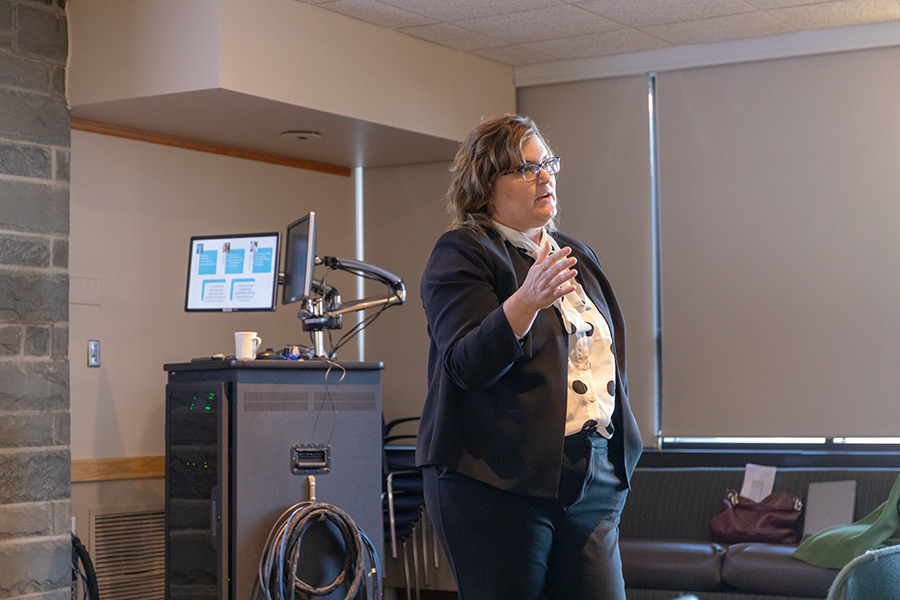Christina Moylan, interim dean of the School of Health Sciences and Human Performance, was the second candidate in the dean search for the School of HSHP. Moylan presented to about 18 faculty members Feb. 14 in the Klingenstein Lounge.
Moylan took over as interim dean of the School of HSHP for the 2023–24 academic year after Linda Petrosino ’78 retired as the dean. Before she was interim dean, Moylan served as associate provost for graduate and professional studies and as director of public health emergency preparedness in the 2020–21 academic year.
Moylan’s presentation, “Future Opportunities and Challenges in Health Sciences and Health Education at Ithaca College,” outlined two goals that Moylan said she wished to add in order to improve the current vision of the school.
Moylan said that in addition to one of the goals being gaining recognition, the school of HSHP should also focus on retaining students to build an inclusive healthcare workforce and share the school’s expertise with the community off-campus.
“The first [added vision is about] who we’re bringing to the school, how we’re keeping them here, as well as their level of preparation to work in a diverse world and with diverse populations,” Moylan said. “The second is that I really want to lean into the expertise that we have at the institution, and particularly within our school … to be solution-oriented.”
Moylan outlined three strategies that she said she saw as the pillars to accomplish the visions of the school: solid infrastructure, academic excellence and health workforce needs.
Strong infrastructure
Within infrastructure, Moylan emphasized the importance of stabilizing enrollment, retaining students and managing resources efficiently. One of Moylan’s ideas about enrollment was to create a pipeline of students who could potentially transfer to Ithaca College from Tompkins Cortland Community College.
Moylan said that even though the college has an articulation agreement with TC3 — which is a document between the two colleges that eases the pathway for students to transfer — the school of HSHP does not have the infrastructure to bring the pipeline into fruition.
“It is going to take … a little bit more pushing to really get this into place,” Moylan said. “What I want us all to remember is that articulation agreements are … pieces of paper that some administrators have signed and said ‘This is really good idea,’ … but it doesn’t really get us where we need to be as a school.”
Moylan said she also wants to focus on building a social media presence and developing inclusive admission practices for both undergraduate and graduate admissions. Moylan said that thinking about student retention is as important as thinking about student enrollment.
“How do we keep [students] sort of engaged and wanting to be in the health professions if we have academic policies that are so restrictive that the first time they try, and they fail, that we kick them out of our programs?” Moylan said.
Moylan said that managing resources efficiently involves looking at both capital and human resources. Moylan said she wants to also focus on hiring and retaining faculty and engage them in leadership development opportunities as well.
“We function as an institution based on people,” Moylan said. “That’s sort of our currency outside of the money.”
Academic excellence
Moylan said that focusing on academics involves enhancing curricular and co-curricular offerings, promoting interdisciplinary scholarship and recognizing faculty research and achievements.
Moylan said that solidifying a simulation curriculum would be beneficial to the students as it would allow students to practice their theory in imitative practical settings and would also enhance the way programs within the school are marketed. Moylan said the school should also discuss how to integrate emerging topics in healthcare, like artificial intelligence and personalized medicine, into pre-existing program curriculums and give more thought to enhancing Interprofessional Education (IPE.)
“I think it would be quite beneficial for us as a school to have these ad hoc discussions once or twice a year to talk about what’s not in our curriculum that we do want to expose our students to and what’s the best way to do that,” Moylan said. “Is it that we bring in a speaker? Is it that we bring in a panel?”
Health workforce needs
Moylan said that to better serve the needs of the healthcare service and industry, the School of HSHP should offer nontraditional learning opportunities, like the online speech-language pathology master’s degree.
Moylan said she hopes to build better relationships with employers to facilitate clinical precepting in the local area as well. Moylan said the Center for Life Skills and Longview is an example of an underutilized resource that could be enhanced to promote IPE and serve the community.
She also pointed out that state funding is something the school should look into to meet workforce needs.
“The state has a significant amount of money right now that they are starting to pour into healthcare workforce development,” Moylan said. “This is the additional funding that we should be thinking about.”
During the question and answer session, Amy Rominger, clinical associate professor in the Department of SLP and Audiology, asked how Moylan would support non-tenure track faculty (NTEN) with their scholarship.
In 2021, one of the final recommendations of the Academic Program Prioritization was the recommendation that NTEN faculty move toward a 24-credit instructional workload.
“I know we can’t predict the future, but I know a lot of this conversation came up last year when there was talk about having all NTENs go to 24-credits teaching,” Rominger said. “What that does is doesn’t give us that little bit of wiggle room in our workload to include scholarship and service.”
Moylan said there is not much that can be done in that regard since demonstrating having a research agenda and clinical proficiency is crucial to be accredited.
“We have different NTENs in the school, some of which are in it are situated in programs and in positions within programs where there is a requirement from the accrediting agency that we’re able to demonstrate that they’re doing scholarship,” Moylan said. “So I think my argument back on that is always going to be old: Do you want us to be unaccredited?”
David Hajjar, associate professor in the Department of SLP and Audiology, asked Moylan what one theme she would choose to focus on if she could pick one.
Moylan said she couldn’t pick one, but believes that enrollment stabilization and community engagement are important aspects of the school’s growth.
“It’s hard for me to pick one thing because I actually see a lot of intersectionality among all of those things,” Moylan said. “I don’t know that I can do one of them without the other. I have a lot of confidence in the enrollment stabilization piece.”




















